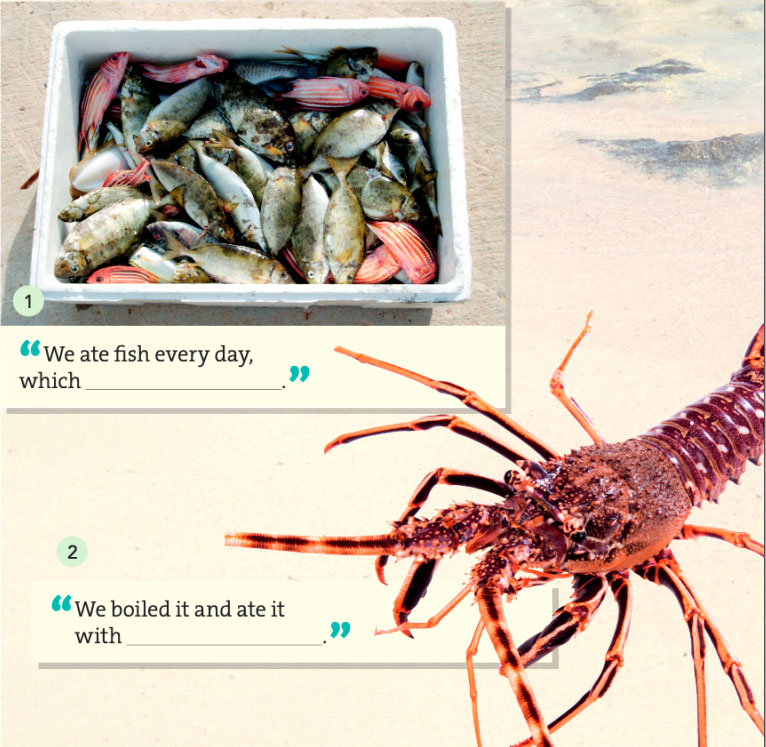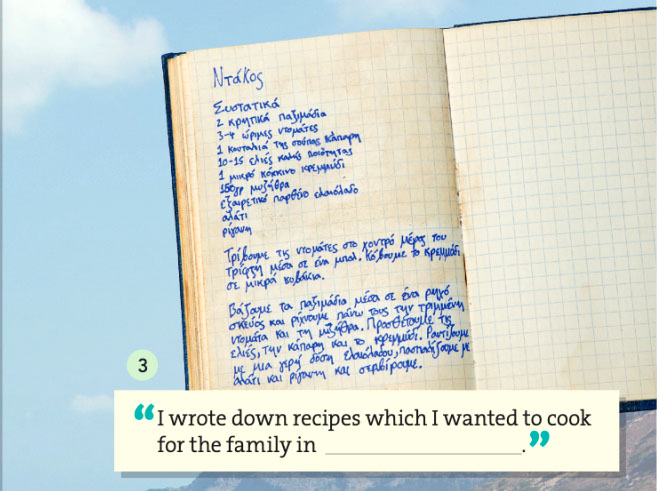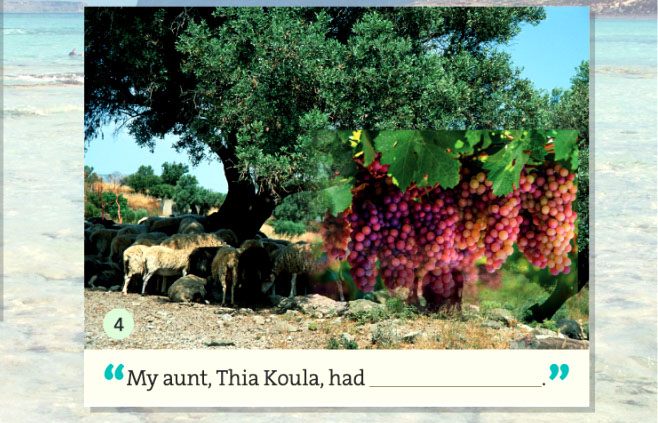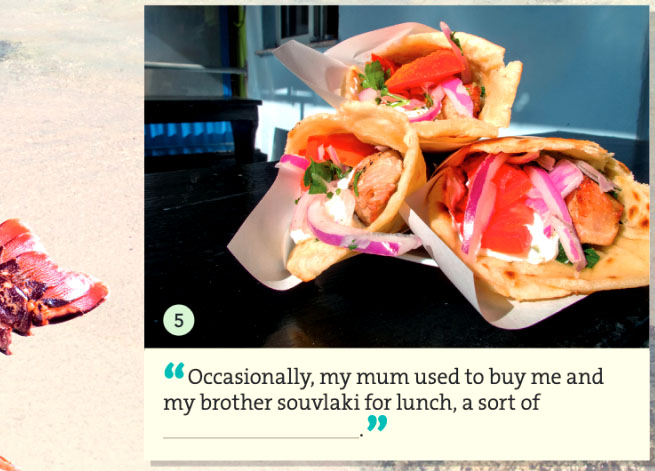Exercise 1
A. Listen to six people each answering one question from Your food profile. Match each speaker to the question he or she is answering.
___ Emma
___ Sarah
___ John
___ Rob
___ James
___ Sean
Your food profile
1 What’s your favorite…?
a snack b pizza topping
b sandwich filling
2 Do you ever have…?
a ready-made food
b take-out food
c very hot / spicy food
3 Are you allergic or intolerant to any food? How long have you had the problem?
4 What food do you usually eat…?
a to cheer yourself up when you’re feeling sad
b when you’re tired and don’t want to cook
5 When you’re away from home, is there any food or drink that you really miss?
6 Is there any food or drink that you couldn’t live without? How often do you eat /drink it?
B. Listen again and write their answers.
Answers
A
Sarah 6 John 2c Rob 4a James 3 Sean 1b
B
Emma tea
Sarah pasta
John curries, Indonesian food, Thai food
Rob chocolate, ice cream
James caffeine / coffee
Sean meat / pepperoni
Audioscripts
Emma
Definitely tea. I went to Slovenia on holiday recently, and I was staying in a hotel and they didn’t have any real English breakfast tea. I really missed it in the mornings.
Sarah
I absolutely love pasta, and I try and eat it whenever I can, so I would find it really difficult to…to live without pasta. Pasta and pesto is my favourite meal, and I have it at least twice a week, normally when my husband’s away, because he’s always telling me not to eat so much pasta.
John
Yes, er, quite often. My wife’s from Asia, from Indonesia, so we often…we often eat hot food. Erm, I love hot food, er, curries, any Indonesian food. I also love Thai food, like a good green curry.
Rob
I guess, like a lot of people, I tend to eat chocolate in that situation – chocolate or ice cream, maybe. Definitely something sweet.
James
Only caffeine, actually, which I didn’t use to be. I used to drink a lot of coffee, but a few years ago I started noticing that it was… it was affecting me quite badly when I drank coffee. I was getting headaches and, er, I’ve never been tested for it, but, er, I’ve stopped drinking caffeine – caffeine in coffee – and I think…I think I feel better.
Sean
I like spicy ones, and I like them with meat, so maybe pepperoni. That’s what I always end up ordering in an Italian restaurant.
Exercise 2
A. Read the text about Marianna. Then look at the five photos and extracts from in interview with her. Say how you think she finishes each sentence.
Marianna Leivaditaki
is the head chef at Morito, a very popular restaurant on Hackney Road, in London. She was born on the island of Crete, in Greece. Her father was a Cretan fisherman and her mother was Scottish. Together they ran a seafood restaurant, which is where Marianna spent most of her childhood.




B. Listen to Part 1 of an interview with Marianna and check your answers to A.
Answers
1 my dad caught
2 lemon and olive oil
3 a small blue notebook
4 animals, a garden, olive trees, and grapes
5 Greek sandwich with pita bread
Audioscripts
I = interviewer, M = Marianna Leivaditaki
Part 1
I With me today I have Marianna Leivaditaki, head chef of the Morito restaurant in Hackney. Marianna, what was your favourite food when you were a child?
M At home we ate a funny mixture because of my parents. Fresh fish, bacon and eggs for breakfast on Sundays, and traditional apple pies. But my favourite was fish. We ate fish every day, which my dad caught. In fact, my dad still goes fishing every night!
I Wow!
M Yes, we were very lucky because not all families could do that – could eat fish every day. Even on an island, fish is expensive, unfortunately.
I Did your dad catch fish for the family or for the restaurant?
M For both. Except for lobsters. When he caught a lobster, he never sold it; it was always for us. We boiled it and ate it with lemon and olive oil. You don’t need anything except lemon and olive oil when fish and seafood is really fresh. That’s how I cook lobsters nowadays in the restaurant, in Morito.
I Were you interested in cooking when you were a child?
M Oh yes. I spent every evening in our restaurant, and instead of playing with the other children, I usually helped in the kitchen. I wrote down recipes which I wanted to cook for the family in a small blue notebook.
I So your love of food and cooking came from your parents?
M From my parents and also from my aunt, and from many inspiring ladies who surrounded me when I was growing up. My aunt, Thia Koula, had animals, a garden, olive trees, and grapes. In the summer, I often spent all day with her. She knew everything about wild food in Crete. She only ate what she had grown or found or made herself. It’s such a beautiful way to eat.
I Did you ever eat out as a child?
M Never in the evening, because our restaurant was open for dinner seven days a week, but occasionally my mum used to buy me and my brother souvlaki for lunch, a sort of Greek sandwich with pitta bread. Inside it has pork, tomato, red onion, and lots of thick yogurt.
C. Now listen to Part 2 and answer the questions.
1 What three things did Marianna do before becoming a chef in London?
2 What was her first connection with the restaurant Moro? Why did she go back to it later?
3 What happened seven years later?
4 How is her restaurant, Morito, different from Moro?
5 How often does she go back to Crete? What happens when she has lunch with her old friends there?
Answers
1 She studied psychology at Kent University. She traveled around southern Europe and South America. She went back to Crete and worked in the family restaurant.
2 When she was a student, she used to save money and go and eat there. Because she wanted to work there.
3 She became head chef.
4 It has more Cretan dishes on the menu.
5 Four or five times a year. They share all the food and always order too much.
Audioscripts
Part 2
I So did you always want to be a chef, to have your own restaurant?
M No, not at all. I wanted to be a psychologist, and when I was eighteen, I came to the UK to study at Kent University. Then I decided I didn’t want to be a psychologist after all, and I went travelling for a bit – I’d saved some money at university because I worked in the evenings. I went all around southern Europe and also to South America, to Ecuador. I tried all sorts of different dishes and fell in love with food again, so I went back to Crete and worked in our family restaurant for two years.
I Why did you come back to the UK?
M Well, I wanted to continue working as a chef, but I needed a bigger challenge. And when I was a student in the UK and I missed good food, I used to save money and go to London to have dinner in the restaurant called Moro. It wasn’t Greek food, but it was Mediterranean, Spanish, North African, and I loved it. So when I came back to London, I went to Moro and I said, ‘I want a job’ – and they gave me one.
I And what happened then?
M Well, really slowly, through hard work, and after seven years, I became head chef. It was magic. And then the owners of Moro, Samantha and Samuel Clark, suggested that I help them open Morito.
I How is Morito different from Moro?
M It’s the same inspiration, and many of the dishes are similar, but because I run the kitchen, I have been able to have more Cretan dishes on the menu – dishes from my childhood. This week, for example, I’m making ntakos, a Cretan salad made with fresh goat’s cheese, tomato, and bread.
I Do you go back to Crete much?
M Yes, I go to Crete maybe four or five times a year. My family’s restaurant is closed now, but I go out for lunch with my friends, the people I miss when I’m in London. Food comes, and we share everything. We always order too much, and by the end of it we feel incredibly full.
I Well, Marianna, it’s been great chatting to you, and thanks for coming in.
M Thank you very much for having me.
